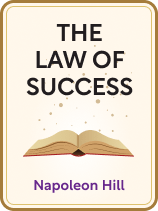

This article is an excerpt from the Shortform book guide to "The Law of Success" by Napoleon Hill. Shortform has the world's best summaries and analyses of books you should be reading.
Like this article? Sign up for a free trial here.
What is the key to success in life? Why do some people become successful against all odds while others fail miserably no matter how hard they try?
According to Napoleon Hill, the author of The Law of Success, your subconscious mind determines how successful you are. If you’re not achieving the level of success you want, it’s because your habitual, conscious thoughts have trained your subconscious mind to work against your best interests.
Keep reading to learn how your subconscious mind impacts your success.
How Your Subconscious Mind Determines Your Success
What is the key to success in life? In his book The Law of Success, Napoleon Hill argues that the key to success lies in mastering your subconscious mind. Hill explains that your subconscious mind creates your life experiences, drawing upon your habitual thoughts. According to him, these habitual thoughts can either train your subconscious mind to work in alignment with your goals (creating successful experiences) or in opposition to them (creating unsuccessful experiences). Therefore, the only way to achieve success is to align your habitual thoughts with what you want to achieve and retrain your subconscious mind to work in your favor.
Principle #1: Your Habitual Conscious Thoughts Train Your Subconscious Mind
Hill argues that your conscious thoughts leave an impression on your subconscious mind, and the more often you think certain thoughts (the more habitual they are), the heavier the impression they leave. This impression trains your subconscious mind to form conclusions about who you are and what’s important to you—your personality traits and your deepest desires, fears, and beliefs. Your subconscious mind then influences you to automatically think and behave in ways that reflect and reinforce those conclusions.
(Shortform note: There’s still much to learn about how the subconscious mind works, but even in 1928, Hill was right about its importance—neuroscientists have since found that 95% of your brain activity takes place beyond your conscious awareness, in your subconscious mind. Further, research reveals that your subconscious mind makes decisions about how to feel or act before your conscious mind even perceives the need to make a decision—thus supporting Hill’s argument that your subconscious mind influences you to automatically think and behave in specific ways.)
Example #1: You habitually think about how lonely you are and you imprint this sentiment upon your subconscious mind. Your subconscious mind concludes that you are lonely. As a result, each time you’re around people, your subconscious mind influences you to think and behave in ways that reinforce your loneliness—for instance, by making you feel socially anxious or urging you to push people away.
Example #2: You habitually think about how difficult it is to complete a certain task and you imprint this sentiment upon your subconscious mind. Your subconscious mind concludes, “This task is difficult.” As a result, each time you’re faced with this task, your subconscious mind influences you to think and behave in ways that reinforce the belief that it’s difficult—for instance, by making you feel overwhelmed or tempting you to procrastinate.
Principle #2: Your Subconscious Mind Creates Your Experiences
Hill argues that, in addition to influencing the way you respond to what happens in your life, your subconscious mind creates experiences that reflect your habitual thoughts. He explains that your subconscious mind has the power to create your experiences because it’s connected to and interacts with higher consciousness—the force that creates and manages all experiences across the entire universe. This higher consciousness has three distinct traits:
- It’s the source of all knowledge, containing all the thoughts ever released by conscious beings.
- Its energy permeates and connects all matter in the universe.
- It synchronizes all interactions that take place in the universe.
Hill explains that, through its connection to higher consciousness, your subconscious mind can potentially connect to and attract any idea, person, or circumstance into your life. However, the impressions your habitual thoughts leave on your subconscious mind restrict its connection only to the ideas, people, or circumstances that reflect the conclusions your conscious mind has formed about you. These conclusions include how you feel about yourself, your expectations, your hopes, and your fears.
To clarify Hill’s thoughts on how your habitual thoughts restrict your experiences, let’s explore how your subconscious mind attracts ideas, people, and circumstances in more detail.
How Your Subconscious Mind Receives Ideas
Hill explains that your subconscious mind receives all of your thoughts and ideas through its connection to higher consciousness. Though higher consciousness is the source of all knowledge (because it contains the collective thoughts of humanity), your subconscious mind can only access thoughts and ideas within higher consciousness that are consistent with your habitual thoughts.
How Your Subconscious Mind Attracts People
Hill states that, just as your subconscious mind restricts the thoughts and ideas you can access from higher consciousness, it also limits the people you attract into your life. He explains that the energy of higher consciousness permeates all conscious beings and connects them telepathically. Through this telepathic link, your subconscious mind orchestrates interactions that cause certain people to show up in your life. However, though higher consciousness has a telepathic connection to all conscious beings, your subconscious mind can only telepathically link to and attract people who reinforce your habitual thoughts.
How Your Subconscious Mind Creates Experiences
Hill asserts that your subconscious mind creates all of your experiences through its connection to higher consciousness. He explains that the energy of higher consciousness permeates and connects all matter in the universe. Through this connection, higher consciousness orchestrates interactions and governs everything that happens in the world. However, though higher consciousness has a connection to everything—giving it the potential to create any type of experience—your subconscious mind can only connect to and create experiences that reinforce your habitual thoughts.

———End of Preview———
Like what you just read? Read the rest of the world's best book summary and analysis of Napoleon Hill's "The Law of Success" at Shortform.
Here's what you'll find in our full The Law of Success summary:
- How your subconscious mind creates your life experiences
- Why the only way to achieve success is to realign your habitual thoughts
- Actionable advice on how to retrain your subconsciousmind for success






